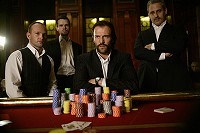 Into the Mind of Revolver
Into the Mind of Revolver
 After Lock Stock and Snatch, Revolver is Jason Statham's third project with the filmmaker who gave him his big screen career. So as expected, he has some insight into the inner workings of the plot as well...
After Lock Stock and Snatch, Revolver is Jason Statham's third project with the filmmaker who gave him his big screen career. So as expected, he has some insight into the inner workings of the plot as well...
Can you describe your character in Revolver for us?
Statham: I play Jake Green who is a condemned gambler. He’s many, many things. He’s essentially a conman that gets wronged by the legendary Dorothy Macha, serves a large sentence for him in prison, comes out, spends two years making a load of money and decides to go and make a bit more out of the man who put him in jail.
So he pays a visit to Macha’s casino simply for revenge?
Statham: Obviously, there’s a bit of revenge. There must be a few emotions going through his head. To humiliate somebody like Dorothy Macha is probably the biggest motivation especially among people he’d like to look the man in front of. Personal revenge and to shove a bit of humiliation down Macha’s throat are probably Jake’s prime motivations.
Who is Dorothy Macha?
Statham: He’s a crook, a “crim” that runs a big casino and disposes of people very quickly without the bat of an eyelid. There’s a line that describes him pretty succinctly, “He’ll pass the death sentence faster than you’ll pass the salt.” He’s driven by greed and lots of money. That is the character of Dorothy Macha.
Coming out of the casino, Jakes makes the acquaintance of a strange character, played by Vinnie Pastore…
Statham: Yes, Zack is a little bit of a mystery and it’s only towards the end of the movie that we learn where and how he came to be who he is. I don’t want to give too much away about Zack but it’s a bit of a head-spinner for Jake when he appears. Zack works very closely with his partner Avi, played by André 3000 or André Benjamin, however you like to call him. They are two of the pivotal characters in the movie, a bit of a mystery but all will be revealed…
And who is Sam Gold, the Mr. Big we never get to see?
Statham: Everybody wants to get in business with Sam Gold, the man that Dorothy Macha’s driven by getting in bed with. That’s the summit of the mountain. Do business with Mr. Gold and you can go no higher. Jake might like to get in business with him, too. Jake’s driven by all things nice and flashy. Money’s a very big part of his life and Sam Gold controls all the money. I’m sure Jake’s been working for Sam Gold longer than he realizes. I think we’re all working for him.
Around the main protagonists, there’s an array of wonderful secondary characters, could you say a few words about some of them?
Statham: There’s the three Eddies, flash, loud, proud and stupid. The deadly, female assassin. Lily Walker, a pair of dark glasses, darker than dark. Sorter, the stuttering assassin, who never misses, played by Mark Strong, who happens to be one of my favorite British actors.
When did Guy Ritchie first mention the film to you?
Statham: The first time he mentioned it was a couple of years ago and then he gave me 90 pages to read, then a different 90 pages. The script’s been spun on its head so many times but that’s the way Guy works. He’s got such an engaged mind. He had so many amazing, colorful characters, it’s a real shame some of them had to go. What Guy writes is so good but there’s so much of it that consequently you have to let some things go. It’s like a constant work in progress with him but that’s what’s interesting because everything’s always being improved. That’s what makes Guy unique. Some things go in the bin that other people wouldn’t consider putting there.
This is your third film with him, why do you get on so well?
Statham: Our whole relationship exists on competition, whether we’re playing chess or trying beat each other up, we’re always trying to get one up on each other, but never in a serious way, always in a jokey kind of way. We’ve spent a lot of time together over the last few years. He isn’t proud and he hasn’t got an ego about what he writes. If you say something’s no good, he’ll listen to you.
Would you say Revolver is a new direction for him?
Statham: It takes time to approach a movie like this. It takes two years to even write it. I think the fun and games of Snatch and Lock Stock are great but now it’s fun to do something different. It’s such a radical movie. You haven’t seen or you won’t see one like this forever and a day. You’ve got to be wide awake. It takes a lot of balls to get this going, without taking anything away from his previous movies. People come up to me in the street and say that Snatch is their favorite ever movie. I heard that Dr. Dre has two copies, he likes it so much. One’s in the DVD player itself but just in case it gets scratched, the other’s still there in the cellophane. People love those movies. They like the characters and dialogue that Guy creates, and they like the mad stories.
How did you prepare for the role?
Statham: With Guy, we’d have a bit of a wrestle to burn off some energy and then go and sit in the pub and talk about it, peeling away layers and layers. You can talk about it for hours but you have to have a really open mind to even go there. It was enlightening. When you’re trying to create a scene like in the elevator, allowing that battle to take place, it’s a tough nut to crack. That was a scene we shot three or four times because we’d keep saying, “What about this? That should really go in.” You’d be at home and you’d think about something, so next day it would be, “Guy, how about…” It really affects you. It’s deep stuff.
Jake lives in a violent world but he doesn’t use violence to resolve his problems…
Statham: It’s like the perceived enemy is not the real enemy. You can fight without putting your fists up, it’s just a question of knowing how to or knowing that there is a fight there. The hardest battle you’ll ever fight is with yourself.
But others resort to violence very easily, especially Macha…
Statham: I think the violence is very dark. The torture scenes are pretty in-your-face. I don’t know if there can be any pink and fluffy violence, but I think it’s shown the way violence should be. It’s very unembellished, you don’t need to dress it up in any way. When you’re on the receiving end of Dorothy Macha’s violence, you know it’s going to be bad.
Given the contrast between Jake and Macha, is their final confrontation inevitable?
Statham: Jake knows what’s going to happen. He doesn’t need to goad Macha or anything. He can foresee the self-destruction of Mr. Macha and he just lets it happen.
There are clues and symbols of Jake’s evolution throughout the film. Is it symbolic for example, that he always plays chess with the black pieces?
Statham: I don’t think that’s symbolic but chess itself is very symbolic to the movie, to the game. We’re in a game, the con of chess, the con of life. Chess is like the art of war on 64 squares. It’s a killer game. You’re only as good as your opponent. It’s got lots of subliminal messages in the rules and the approach to the game, and how that relates to Jake’s formula because the formula is applicable to many things besides chess.
The formula enables Jake to make his fortune. Can you explain how he came by it?
Statham: While he’s serving his seven years for Macha, Jake’s locked up between two other lifers. One’s a conman and the other’s a chess master. We’ve no idea who these people are but they pass between them chess moves and concepts of the con. These messages transit through Jake, who happens to be in the middle and gets to figure out many things. It’s like an education Jake receives from the guys on either side.
If Jake were a piece on the chess board, which one would he be?
Statham: At the beginning he’s just a pawn. At the end, he’s the king. He’s learned everything there is to learn about yourself. He learns that perceived knowledge is worthless. Everything we think we know about ourselves means nothing.
Physically, you’re almost unrecognisable in the movie…
Statham: You mean the 70s pornstar look. Guy created the whole thing. He had an idea and there it was, even down to the lairy shoes. They were something else, two-tone snakeskin and Cuban heels. Everybody should wear those shoes once. They’re winners.
Of the various quotations that punctuate the movie, do you have a favorite?
Statham: They’re good, aren’t they? I think I’d choose them all. I got them done as tattoos, on each leg and on my back!
What’s the most enjoyable thing about working with Guy?
Statham: Just the sheer lack of confidence he has in all the people around him. He makes you feel so incompetent and useless that it’s hilarious. He makes it fun. He doesn’t seem to take you seriously, but really he does. There’s a great balance there. When you need to do something important, he’ll make it what it needs to be. His environment is so serious, but then it’s not. It’s like “Let’s make a movie and let’s have some fun.” You make a movie with Guy and you don’t forget it.
What was the toughest moment for you?
Statham: The toughest moment is getting Guy Ritchie to pay his debts when he loses at chess. He just won’t pay up. He won’t accept the loss. I have to live with that.
THANKS TO GREENROOM, SEP.05




JASON STATHAM
born 12.Sep.72 in London
FILMOGRAPHY
Transporter 2 (2005)







Ghosts of Mars (2001)
Turn It Up (2000)

Lock, Stock and Two Smoking Barrels (1998)
